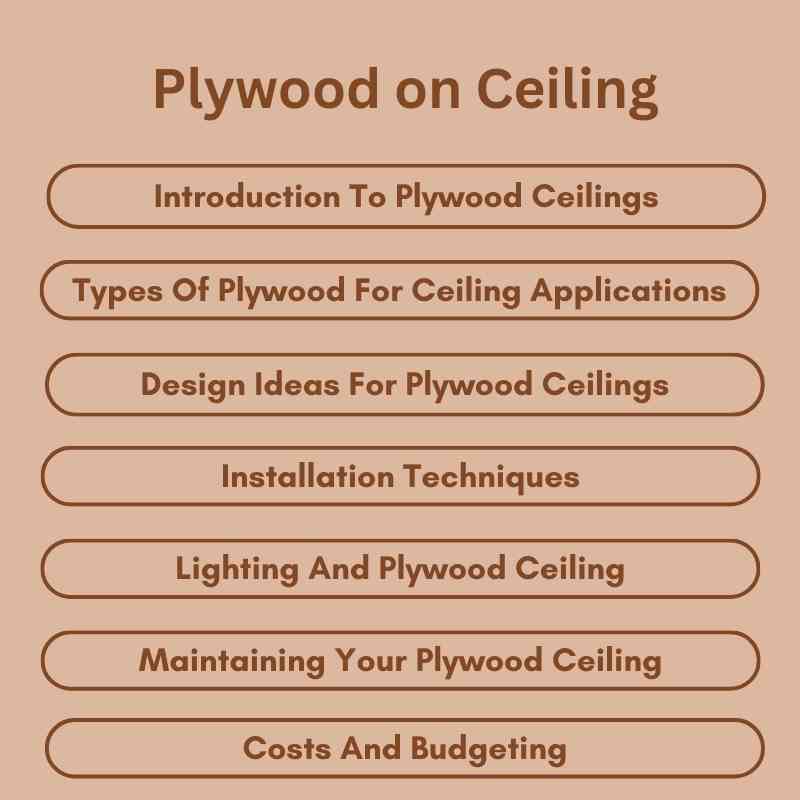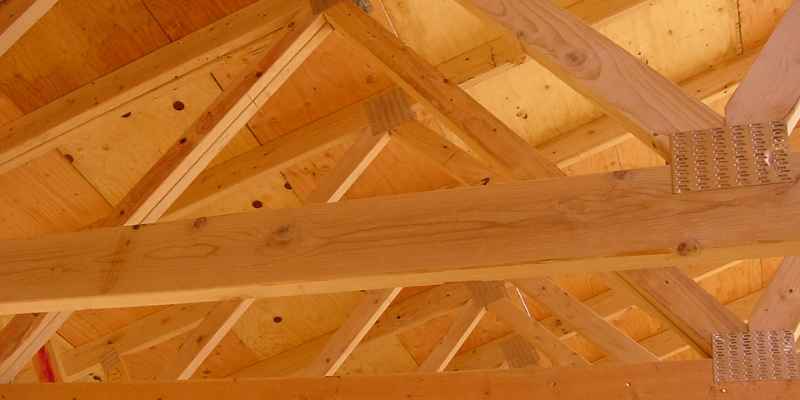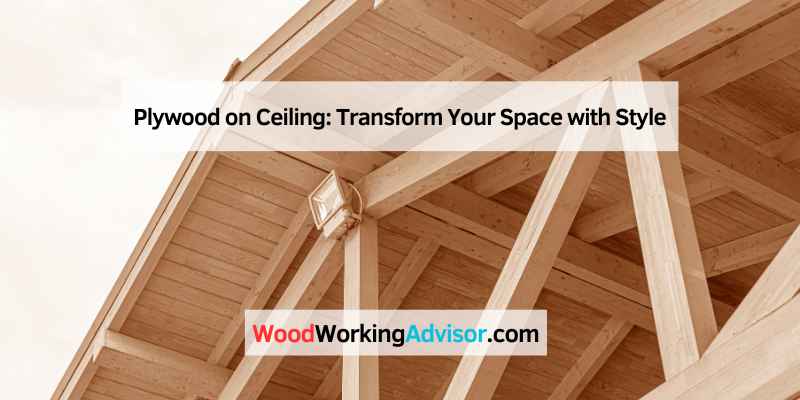Plywood on Ceiling: Transform Your Space with Style
Plywood on the ceiling adds a stylish, modern touch to any space. It offers durability, versatility, and a range of design options.
Using plywood for ceilings is gaining popularity due to its aesthetic appeal and practical benefits. Homeowners appreciate its lightweight nature and ease of installation. Plywood can be stained, painted, or left natural to match various interior styles. It provides excellent insulation and sound absorption, enhancing comfort in living spaces.
This material is also cost-effective, making it accessible for budget-conscious renovations. Whether in a rustic cabin or a contemporary home, plywood ceilings can transform a room’s atmosphere. Explore different patterns and finishes to create a unique look that suits your personal taste and complements your overall decor.
Introduction To Plywood Ceilings
Plywood ceilings offer a unique blend of style and functionality. They add warmth and character to any room. This versatile material suits various design themes. From modern to rustic, plywood enhances the overall aesthetic.
Using plywood on ceilings can transform a space. It provides a natural look while being lightweight and easy to install. Homeowners and designers appreciate its many advantages.
The Aesthetic Appeal
Plywood ceilings bring a natural charm to interiors. The rich textures and grains create visual interest. Here are some key reasons for their aesthetic appeal:
- Variety of Finishes: Choose from stained, painted, or varnished options.
- Customizable Shapes: Plywood can be cut into various designs.
- Warmth of Wood: Wood tones create a cozy atmosphere.
Incorporating plywood ceilings can elevate a room’s design. Their flexibility allows for unique artistic expressions.
Benefits Beyond Beauty
Plywood ceilings offer practical benefits alongside their beauty. Here are some advantages:
| Benefit | Description |
|---|---|
| Durability | Resistant to warping and cracking. |
| Cost-Effectiveness | Affordable compared to other ceiling materials. |
| Easy Installation | Lightweight and simple to work with. |
| Insulation | Helps regulate room temperature. |
These benefits make plywood ceilings a smart choice. They combine beauty and functionality effectively.

Types Of Plywood For Ceiling Applications
Plywood is a popular choice for ceilings. It offers durability and aesthetic appeal. Different types of plywood suit various needs. Understanding these types helps in making the right choice.
Softwood Vs. Hardwood
Softwood and hardwood plywood are the two main categories. Each has unique features and benefits.
| Type | Characteristics | Best Uses |
|---|---|---|
| Softwood |
|
|
| Hardwood |
|
|
Plywood Grades And Varieties
Plywood grades determine quality. Higher grades offer better appearance and durability.
- Grade A: Smooth, sanded surface. Ideal for visible areas.
- Grade B: Minor defects allowed. Good for utility areas.
- Grade C: More imperfections. Suitable for hidden applications.
- Grade D: Lowest quality. Often used in construction.
Varieties of plywood include:
- Decorative Plywood: Enhances aesthetics. Great for interior design.
- Marine Plywood: Water-resistant. Perfect for humid areas.
- Structural Plywood: Strong and sturdy. Used in heavy-duty applications.
Choosing the right plywood type ensures a beautiful and lasting ceiling.
Design Ideas For Plywood Ceilings
Plywood ceilings offer versatility and warmth. They can enhance any room’s atmosphere. Here are some creative ideas for your plywood ceiling.
Patterns And Textures
Incorporating patterns and textures adds depth to your ceiling. Consider these options:
- Chevron Patterns: Create a striking visual with angled lines.
- Grid Patterns: Use square panels for a modern look.
- Beadboard: This adds a classic charm to any space.
- V-groove: Offers a sleek, contemporary finish.
Texture can also be achieved through:
- Rough finishes: Embrace a rustic feel.
- Smooth finishes: Maintain a clean and polished appearance.
Staining And Finishing Options
Staining plywood enhances its natural beauty. Choose the right finish to suit your style.
| Stain Type | Effect | Best For |
|---|---|---|
| Dark Stains | Rich, warm tones | Traditional or rustic themes |
| Light Stains | Brightens the space | Modern or minimalist styles |
| Natural Finish | Showcases wood grain | Contemporary spaces |
Consider these finishing options:
- Polyurethane: Provides durability and shine.
- Oil finishes: Offer a warm, natural look.
- Water-based finishes: Low odor and eco-friendly.
Experiment with different combinations. Make your plywood ceiling a stunning focal point.
Installation Techniques
Installing plywood on the ceiling can transform your space. It adds warmth and character. Proper techniques ensure a smooth and durable finish. Follow these steps for a successful installation.
Preparing For Installation
Preparation is key to a successful plywood ceiling. Follow these steps:
- Gather tools and materials:
- Plywood sheets
- Measuring tape
- Level
- Drill
- Wood screws
- Stud finder
- Measure the ceiling area carefully.
- Locate the ceiling joists using a stud finder.
- Mark the joist locations for easy reference.
- Cut plywood sheets to size, if necessary.
Step-by-step Guide
Follow this simple guide for installation:
- Start at one corner: Place the first plywood sheet.
- Use a level: Ensure the sheet is straight.
- Screw it in: Attach the plywood to the joists.
- Continue with sheets: Repeat for each section.
- Leave gaps: Allow for expansion between sheets.
- Fill seams: Use caulk for a seamless look.
- Sand the surface: Smooth any rough edges.
- Finish: Apply paint or stain as desired.
| Tools | Purpose |
|---|---|
| Plywood sheets | Ceiling material |
| Measuring tape | Measure areas accurately |
| Level | Ensure straight installation |
| Drill | Attach plywood securely |
| Wood screws | Fasten plywood to joists |
| Stud finder | Locate ceiling joists |
Follow these techniques for a beautiful plywood ceiling. Enjoy your newly enhanced space!
Lighting And Plywood Ceiling
Lighting plays a crucial role in enhancing the beauty of a plywood ceiling. Proper lighting can highlight the texture of the plywood and create a cozy atmosphere. Choosing the right fixtures and integrating them well can transform any space.
Choosing The Right Fixtures
Selecting the right lighting fixtures is vital. Here are some options:
- Recessed Lights: Ideal for a modern look.
- Pendant Lights: Great for dining areas.
- Track Lighting: Offers flexibility in directing light.
- Wall Sconces: Adds warmth and elegance.
Consider the following factors:
- Brightness: Ensure enough light for activities.
- Style: Match fixtures with room decor.
- Size: Choose fixtures that fit the space.
Integration Tips
Integrating lighting with a plywood ceiling requires creativity. Follow these tips:
- Layer Lighting: Use ambient, task, and accent lights.
- Highlight Textures: Use directed light to showcase plywood grains.
- Dimmer Switches: Adjust brightness according to mood.
- Color Temperature: Warm light enhances wood’s natural beauty.
Consider this table for integration styles:
| Fixture Type | Best Use |
|---|---|
| Recessed Lights | General lighting for living rooms |
| Pendant Lights | Focal points in dining areas |
| Track Lighting | Highlighting artwork or features |
| Wall Sconces | Soft lighting in hallways |
These strategies enhance the look of plywood ceilings while improving functionality.
Maintaining Your Plywood Ceiling
Keeping your plywood ceiling++
in great shape is essential. Proper care ensures it lasts longer and looks good. Follow these simple tips to maintain it effectively.
Cleaning And Care
Regular cleaning helps maintain the beauty of your plywood ceiling. Use these steps for effective cleaning:
- Dust the surface with a soft cloth.
- For stains, mix mild soap with water.
- Use a sponge to gently scrub the stained area.
- Rinse with clean water and dry with a cloth.
Avoid harsh chemicals. They can damage the finish. Always test a small area first.
Long-term Durability
To ensure long-term durability, consider these tips:
| Tip | Description |
|---|---|
| Humidity Control | Keep indoor humidity levels between 30-50%. |
| Temperature Regulation | Avoid extreme temperature changes to prevent warping. |
| Sealant Application | Apply a protective sealant every few years. |
Regular maintenance prevents issues like cracking or peeling. Inspect your ceiling periodically for signs of wear.
Costs And Budgeting
Installing plywood on the ceiling can enhance your space. Understanding costs helps you plan better. Budgeting ensures you stay within limits. Here’s how to estimate costs effectively.
Estimating Material And Labor
Start by calculating the material costs. The price of plywood varies based on thickness and type. Here’s a simple table to guide you:
| Plywood Type | Price per Sheet |
|---|---|
| Standard Plywood | $30 – $50 |
| Marine Plywood | $70 – $100 |
| Birch Plywood | $50 – $80 |
Next, consider labor costs. Hiring professionals costs more than DIY. Labor rates vary by location. Expect to pay around $50 to $100 per hour. Calculate hours needed based on your ceiling size.
Cost-saving Tips
Save money by following these tips:
- Buy plywood in bulk for discounts.
- Use reclaimed wood for a unique look.
- Consider DIY installation to cut labor costs.
- Shop sales and promotions for lower prices.
- Choose a simpler design to reduce waste.
Budgeting smartly allows for a stunning ceiling without overspending. Track all expenses closely. This ensures you stay on budget while enjoying your new space.
Real-life Examples
Plywood on ceilings offers stunning transformations in various spaces. Many homeowners and designers have embraced this material. Here are some real-life examples showcasing its versatility.
Case Studies
Let’s explore some inspiring case studies of plywood ceilings:
| Location | Style | Description |
|---|---|---|
| Modern Kitchen | Minimalist | Bright plywood panels create a warm, inviting atmosphere. |
| Cozy Living Room | Rustic | Exposed beams and textured plywood add character. |
| Creative Office | Industrial | Plywood ceilings enhance creativity in a modern workspace. |
Before And After Transformations
Here are some striking before and after transformations:
- Living Room:
- Before: Plain white ceiling, dull ambiance.
- After: Plywood panels, warm and welcoming feel.
- Bedroom:
- Before: Cracked plaster ceiling, outdated look.
- After: Sleek plywood design, modern aesthetic.
- Restaurant:
- Before: Boring drop ceiling, lifeless space.
- After: Natural wood finish, inviting atmosphere.
Plywood ceilings can revitalize any room. They add warmth, texture, and style. The transformations speak volumes about their potential.
Environmental Considerations
Using plywood on ceilings raises important environmental questions. Sustainable practices help minimize negative impacts. Choosing the right materials can support a healthier planet.
Sustainable Sourcing
Plywood can be sourced sustainably. This means it comes from well-managed forests. Look for certifications like:
- FSC (Forest Stewardship Council)
- PEFC (Programme for the Endorsement of Forest Certification)
These certifications ensure responsible forestry practices. They promote biodiversity and protect ecosystems. Sustainable sourcing also supports local communities.
Eco-friendly Finishes
Choosing eco-friendly finishes is crucial. Traditional finishes can release harmful chemicals. Opt for low-VOC (Volatile Organic Compounds) products instead. Benefits include:
- Better indoor air quality
- Reduced environmental impact
- Safety for children and pets
Some options include:
| Finish Type | Benefits |
|---|---|
| Water-Based Paint | Low odor, quick drying |
| Natural Oils | Safe, enhances wood grain |
| Plant-Based Stains | Non-toxic, eco-friendly |
Using eco-friendly finishes protects both health and environment. Making these choices helps create a sustainable future.
Common Mistakes To Avoid
Plywood on ceilings can create stunning aesthetics. Avoiding common mistakes ensures a successful project. Here are some key pitfalls to watch out for.
Poor Installation Practices
Proper installation is crucial. Follow these tips to avoid common errors:
- Ensure you measure accurately.
- Use the right tools for cutting.
- Secure plywood sheets properly to avoid sagging.
- Apply adhesive evenly for better support.
Skipping any of these steps can lead to problems later. Check for leaks or gaps after installation. Regularly inspect for signs of damage.
Choosing The Wrong Plywood
Selecting the right plywood is vital. Consider these factors:
| Type of Plywood | Best Use | Common Issues |
|---|---|---|
| CDX Plywood | General construction | Not moisture-resistant |
| Exterior Plywood | Outdoor use | Can be heavy |
| Baltic Birch | Interior projects | Costlier option |
Choosing the wrong type can lead to costly repairs. Research the best options for your specific needs.
Always consider thickness, finish, and durability. Avoid plywood that isn’t rated for ceiling use.
Future Trends In Ceiling Design
The world of ceiling design is evolving. Plywood is gaining popularity for its versatility and aesthetic appeal. Homeowners are embracing innovative designs that enhance their interiors.
Innovations In Plywood
Plywood offers many possibilities for ceiling design. Here are some innovations to consider:
- Laser-Cut Patterns: Intricate designs create stunning visual effects.
- Textured Finishes: Add depth and interest with unique textures.
- Eco-Friendly Options: Sustainable wood choices appeal to eco-conscious homeowners.
- Modular Systems: Easy to install and customize for any space.
These innovations make plywood a top choice for modern ceilings. Designers are using plywood in creative ways to transform spaces.
What’s Next For Home Interiors
Home interiors are changing. Ceiling design is a key focus. Here are trends shaping the future:
- Natural Aesthetics: Emphasis on earthy tones and organic materials.
- Smart Ceilings: Integration of lighting and sound systems.
- Bold Colors: Vibrant hues to create striking contrasts.
- Ceiling Gardens: Incorporating greenery for a fresh look.
Plywood will play a crucial role in these trends. Its adaptability allows for endless design possibilities. The future of ceiling design is bright and full of creativity.

Frequently Asked Questions
What Are The Benefits Of Plywood On The Ceiling?
Plywood on the ceiling offers several advantages. It enhances aesthetics by adding warmth and texture. Plywood is lightweight and easy to install, making it a practical choice. It also provides good insulation, improving energy efficiency. Additionally, it’s durable and resistant to wear, making it a long-lasting solution.
How To Install Plywood On A Ceiling?
To install plywood on a ceiling, start by measuring the area. Cut the plywood sheets to size and ensure they fit snugly. Use furring strips for support, securing them to the ceiling. Attach the plywood using screws or adhesive, ensuring a tight seal.
Finally, sand and finish as desired for a polished look.
Can Plywood Be Painted Or Stained?
Yes, plywood can be easily painted or stained. For painting, use a primer first for better adhesion. Choose a high-quality paint for durability. If staining, select a wood stain that complements your décor. This customization adds personality and enhances the overall design of your space.
Is Plywood Safe For Ceiling Use?
Plywood is safe for ceiling use when installed correctly. Ensure it meets fire safety standards and is treated for moisture resistance. Proper ventilation can prevent mold growth. Always follow local building codes to ensure compliance. With these precautions, plywood can be a safe and stylish ceiling option.
Conclusion
Plywood on the ceiling can transform any space. It adds warmth and texture, enhancing the overall aesthetic. This versatile material is not only stylish but also cost-effective. Embrace the creativity plywood offers for your ceiling design. Consider this option for a unique touch that elevates your interior decor.







